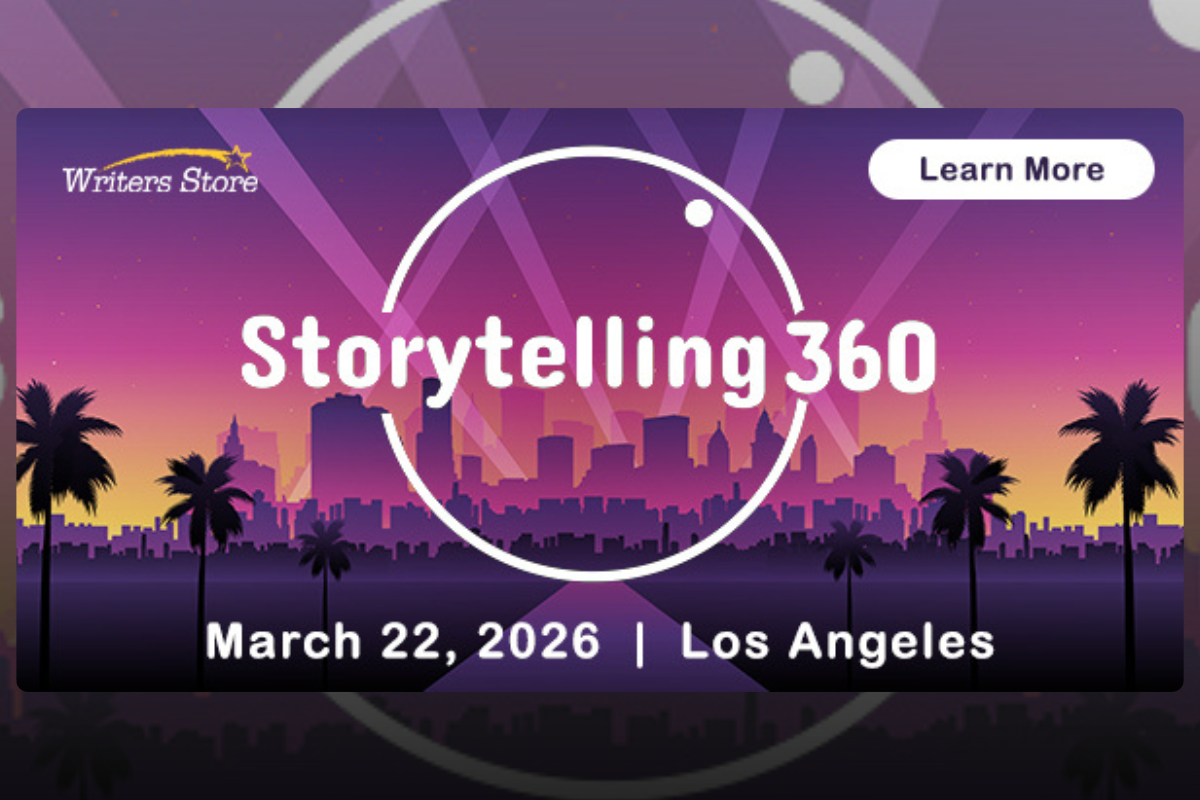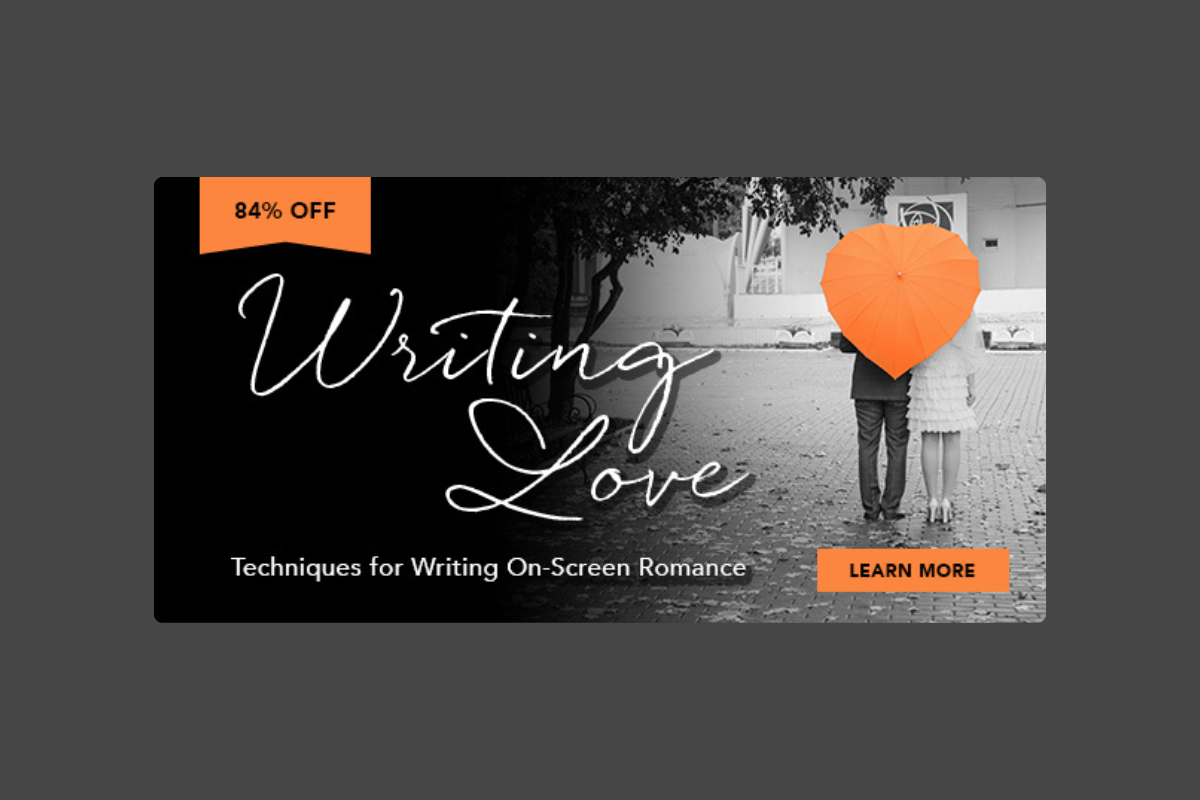BALLS OF STEEL™: Meet Author and Screenwriter Christopher J. Moore
Jeanne Veillette Bowerman talks to former Nickelodeon Fellowship winner, Christopher J. Moore, on why he’s turning his spec scripts into novels.
A couple of years ago, I had the pleasure of interviewing Christopher J. Moore, feature screenwriter, TV writer, author and professor at Chapman University's TV Writing and Producing M.F.A. program. Chris recently taught an on-demand webinar for The Writers Store, Writing TV from Inside Hollywood and Out, so I thought it was a good time to revisit Chris's writing journey and inspirational advice. If you're looking to break into TV, get Chris' on-demand webinar today!
When I go to L.A., I always frequent the same coffeeshop to get my local-screenwriter fix. No, I can’t share the name of the establishment because I promised those writers I wouldn’t give away their secret writing cave. And no, it’s not a Panera.
On a recent trip, I met the most fascinating group of gentlemen (though they’re probably reading this and snickering at being referred to as ‘gentlemen’) in the back room, all seated at separate tables, typing away in between cracking jokes and ribbing each other about their projects. It was the perfect balance of work and water-cooler banter. By the time the afternoon was over, I had been initiated into their writers’ circle and looked forward to joining them again before my trip ended.
Today, I want to introduce you to one of those men, Christopher J. Moore.
Chris caught my attention not just because he was dishing the smack talk as good as he was getting it, but also because, despite being a professional screenwriter who actually gets paid for his words, he was sifting through a manuscript instead of a screenplay.
I asked Chris if he’d be willing to share with our readers why he started turning his spec scripts into novels.
A little backstory on Chris first. He graduated from film school in 1997, and three years later, won the Nickelodeon Fellowship, garnering him an agent and a full-time writer title.
What is it about this coffeeshop that keeps calling your name?
A lot of people don’t understand writers. They don't understand that you chose a career where you’re rolling dice on life. The guys at the coffeeshop get it and understand. You can burn your spouse out with talking or complaining about this business. When I don't write I get depressed. Then if I write, even if only for 15 or 20 minutes, it’s like Prozac. Its like someone injected me. I feel optimistic, like I can take over the world.
All of us dream of being a full-time working writer. What does a typical writing day look like for you?
Nothing glamorous. Wake up, take kids to school, come back, go to the office or write in the family room until about 1:00PM. Then I take a walk and go to the coffeehouse with my fellow writers for two or three hours. Come home and deal with the kids. Have family time. At 10PM, I start writing some more until whenever I feel finished.
But there are some days that are totally different. I have to put my business hat on and sell books, dropping them off at bookstores, book clubs, a school, even a hospital. If I see you at a gas station, I might stop and ask if you read fiction and hand you a book.
A lot mixed into being a writer is returning emails and dealing with the business side. Hey, but I love just writing for a living, and because of books, I haven't missed a beat.
How many scripts have you written?
I’ve written at least 20 features scripts, not counting all the TV scripts and pilots. It’s so funny, you don't really think about it, whether you’re writing them on spec or writing them for someone. I’m always writing. Now I have enough material to keep my agent busy, so I’m writing novels.
Of those scripts, about a dozen are specs. In this business you’re constantly coming up with ideas. I wanted to write specs and not be in the market to write for someone all the time, more like an author. I like to come up with original ideas. To me, that’s more satisfying.
What made you decide to turn them into novels?
I won Nickelodeon Fellowship in 2000 with God’s Child on spec. Then I started having these meetings all over town. Keep in mind, this is 2000. God’s Child is about an African-American family; it’s more like Terms of Endearment. That movie was probably one of the biggest influences. My grandmother had passed, and I just wanted to write a drama. I was in that mode. It was one of those scripts that was personal. After I won, I went out on meetings. Everyone loved it, but it was a black drama, and it didn't have someone waving a gun through the whole thing. I thought to myself, one thing everyone would identify with, is it was not a black story; it was a human story. It can be black, white or whatever. How can I get the story out there because people only see it one way, especially when they see me… an African American? People have a perception about what it should be. As I kept getting the same notes, I explained that’s not what the story is. That experience made me think of turning it into a book, and then it could be exactly the way I want it.
It worked out great because the screenplay functioned like an awesome outline. I studied character, and all different things about story, so I knew how to tell a story, even though it was my first novel.
What surprised you about process?
First thing I did was I started to read books differently. I’d look at books like TheOld Man and the Sea by Ernest Hemingway, who’s known for straight-to-the-point writing. I read and studied it. Then I read Dan Brown’s Da Vinci Code and Toni Morrison. I would read them, not just to enjoy the story, but also to see how they broke up the chapters, or if they wrote in 1st person or 3rd person. I wrote the first couple of chapters in the first person, then I felt locked into one character, so I tried 3rd person. I just kind of studied. It wasn’t hard for me. I enjoyed it. I could really rank up the tension and prolong it. I didn't have to hit the inciting incident on page 10. I didn't have any of those restrictions we have in screenwriting. To me, the only rule was to make people turn the page. That was what was so freeing about it. I still love screenwriting, but it is a different muscle.
Do you think writing novels helped your screenwriting?
What’s cool about it is my books have always been scripts, but now, I’m living with these characters more. It takes me longer because I’m constantly thinking about them. I’m able to do things with them that if I was just writing the script, people would think it was a waste of time and pages. You’re discovering more about the characters through plot than backstory in scripts. As I’ve written the book, it makes me go back to the script and put something new in because it’s important. In my books, I write the screenplay first. It helps me stay on point to write a fast-paced novel that people won’t put down.
Self-publishing or traditional publishing? Was the fact that writers have little control over the fate of their screenplays part of your decision?
Yes, I researched people who had self-published. There’s so much information out there. I looked into it, and decided I didn't want to go to a major publisher. Times are different, and they aren’t handing out big book deals anymore. So I was looking at it from the point of view that if I’m going to do this, I need to treat it like a business. It’s kind of like going into a shark tank with a publisher. Even if they gave you $50,000, you aren’t going to see a dime from your book sales until that $50,000 is recouped. So basically it's a loan. And they own it. And most book offers nowadays are between 5 to 10 thousand, and the royalties are around 6 percent. So if you have an agent he'll tell you not to quit your day job. It puts things in perspective. Plus you'll know when a publisher is serious about your book and offers you a real deal.
It's a small group of people who make a great living writing books. Most of them have jobs or else they’d starve. Ultimately, you have to look at it like a business, and you have to be honest with yourself. Am I the kind of person that will get in my car and sell some books or go to a fair and stand out there promoting? If you just want to write the novels and let other people handle it, then you should go the traditional publishing route. But nowadays, it’s kind of changed too where if you have a publisher, their going to say, “What’s your plan? How many Twitter followers? What are you going to do?” It’s like you’re doing it anyway. It’s the nature of the beast.
What are your long-term goals regarding writing?
I’m a storyteller. I love writing on a TV show. I love the process of writing screenplays, television, novels and, at times in my career, all three are going on. I sold a script when I was on a TV show, and at the same time my book was coming out. I love all of it. I even love traveling all over the country selling my books. I look at Michael Crichton's career, and I thought if I can wave a magic wand, that kind of career would be awesome. He’s not someone who just created shows; he wrote the scripts to his movies as well as 20 or 30 novels. That's so much more fulfilling than if he was just writing screenplays. Maybe he would have only had two movies made, especially originals. One thing people don't realize about screenwriting is most of the time when people have a lot of movies made, it’s not like they have 10 or 15 movies made; its not like they sold 15 spec scripts and they went into production. Most of time, they sold one or two and then were able to rewrite people and get credit or get an assignment for something already going into production. For the every day writer, if you get a couple movies in your career, you’re so lucky. That's what I love about the books; it’s going to allow me to create a body of work for people to read.
I’m not saying it’s never going to happen. I’m a dreamer. An optimist. Life is about living for the dream, but sometimes people look at writers who have literally had lightening in the bottle strike three times, like Shane Black, and think that’s what will happen. Not to say that it can’t happen, but we look at these things that happen to one person, but there are thousands of people out here trying. It’s tough. It took me eight years to sell my first spec script.
I graduated from film school in 1997, won the fellowship three years later. I was fortunate. Sold screenplays worked on shows, wrote for all kinds of different producers, sold a whole lot of books and even went back to college and got my Masters in screenwriting just last year. Because I understand that, as writers, we should be constantly learning and growing in our craft.
What’s your advice to survive the marathon?
Sometimes you complain because you’re constantly comparing your success to other peoples’ success. You set yourself up to be depressed or quit. You have to define your own success. Someone sees the movie may make $200M in the box office and yours may make $200,000. If you’re truly in this business because you love the art and the work, it should not matter. You are doing what you love. I had this revelation through the last few years of my career where I realized my writing in and of itself was success.
As you get older, you start thinking I could have been a doctor or a surgeon… I haven’t had one of my features made… you start to question it. I honestly feel this is a calling. It is something I feel the Creator put us on this planet to do. That's what keeps me going. It keeps me motivated. It’s not about money or being a multimillionaire in Beverly Hills, overlooking the city. That's just stuff that people perceive how Hollywood is.
Hollywood is smoke and mirrors. There are people out here who are famous in this town and broke. The money comes and goes even faster. Everything isn’t what it seems, so it has to be about more than just doing it for money and glory. It truly needs to be a calling. Otherwise, make your life easier and pick something else to do.
We spend all this time working on these stories, but you have to catch lighting in a bottle to sell it, then again to go into production, then again that it's even good. That's why I tapped out a long time ago as to trying to control something I have no control over. When the Universe is ready for you to have it, nothing can stop it. That's why if you love it, never quit.
This example of a conversation I have far too often should make people realize what a crazy business this is:
How do you sell a script? Well, you get an agent to get a company to buy it. How do you get an agent? You need to get a company to buy it to get an agent.
So you started writing novels?
Novels have saved my life. I have a lot of TV credits, but I’m telling you, when I’m out there on the streets and people come up to me and tell me they read one of my novels three or four times, that is so much more gratifying than when I walk onto the set of a TV show I'm writing for and hear three or more million viewers saw your episode. My books are so much more gratifying.
One thing about books that is cool is they can live on forever. People can discover your book 100 years from now. Jane Austin never made a living as a writer. She was published, but she wasn't a big hit until later. Now her books are best sellers and turned into movies.
Books can also travel. I live in L.A., and when people come here from around the world, I sell my books to them. They take them home, and share them with their friends. No going to DVD hell for them. I had a person tell me, “My son sent me your book, and he’s in Afghanistan. All the people there were reading it.” I was like, what? Afghanistan?
When I used to hear the war stories that it took 15 years to get a certain movie made, I didn't realize they really meant that! I have a project they’ve been talking about for eight years now. Life is short. I’m so glad I’m not going to have a stack of scripts sitting in my closet. When I’m gone, I’m going to have my stories out in the world. People will either love them or hate them, but they’re out there.
John Ridley is one of my earliest inspirations. He wrote the book U Turn and Oliver Stone turned it into a movie with Jennifer Lopez. He was also a TV writer on Fresh Prince of Bel Air, one of the writers on Red Tale, and wrote 12 Years a Slave. He was one of my inspirations as to wanting to write a book too. He was writing novels and scripts. He’s had a nice run in Hollywood, but he’s always written books. It seems like a more full life and a happier life. I’ve met and am friends with A-list writers, and trust me, when they can’t get their stories out there, they are just as unhappy and beat up as the writer who has never sold a script.
What advice would you give your 18-year-old self?
To understand that it's a business. To understand that you have to love it. And also not to put life off for screenwriting. And I would say that to actors, producers and anyone in this business. Get married, if you want to, have kids, don't do the ol’ “I have to wait until my movie goes into production or sell a script.” You can sell a script, get married and have kids and be broke by the time the baby is delivered. Live your life.
I figured that out while I was at Nickelodeon. We had our first baby when I was at the end of the fellowship. My wife and I had made a conscious decision we were going to do this. It's the best decision I made. When you have kids and family, your priorities change a little, but at the same time, you still have to do what you love. I’ve been pretty fortunate in my career, being able to make a living, but at the same time, I’m so thankful I wasn’t putting life on hold. That's how you end up bitter, angry and constantly comparing yourself to others.
As you’re pursuing your writing career, live your life, travel, and enjoy life. Define your own success. Find a job. Do not be one of these writers who sits at home, staring at the phone and waiting for Hollywood to call… find a job that allows you to get that writing in, even if it’s just an hour a day. I used to work with disabled adults. I got more writing done back then working a job than I did when I was just writing full-time at home. You don't want to sit and wait. That only makes you mad, desperate, and make bad choices. But if you have that gig that allows you to feed yourself, you’re able to be in it for the long haul and not feel like it needs to happen yesterday.
Christopher J. Moore’s books, The Five Steps of Mr. Washington, Waiting For Mr. Right and God's Child are available on Amazon. Follow Christopher on Twitter @ChrisJMoore06 and Facebook.
- Balls of Steel: Script to Novel – 5 Steps to Adapting Backwards
- More Balls of Steel articles by Jeanne Veillette Bowerman
- Balls of Steel: Challenge Yourself to Change
Get Christopher J. Moore's On-Demand Webinar
Writing TV from Inside Hollywood and Out
Jeanne Veillette Bowerman is a Senior Executive at Pipeline Media Group and Book Pipeline, Editor-in-Chief of Pipeline Artists, Director of Symposium—a year-round conference in the arts, co-host "Reckless Creatives" podcast, partner at Fringe Press, former Editor-in-Chief of Script magazine and a former Senior Editor at Writer's Digest. Recognized as one of the "Top 10 Most Influential Screenwriting Bloggers," her "Balls of Steel" column was selected as recommended reading by Universal Writers Program. A compilation of her articles is now available at The Writers Store—Balls of Steel: The Screenwriter's Mindset. She is also Co-Founder and moderator of X's weekly screenwriters’ chat, #Scriptchat, and wrote the narrative adaptation of the Pulitzer Prize-winning book, Slavery by Another Name, with its author, Douglas A. Blackmon, former senior national correspondent of The Wall Street Journal. More information can be found on her website. X: @jeannevb | IG/Threads: @jeannevb_ | BlueSky: @jeannevb.bsky.social







